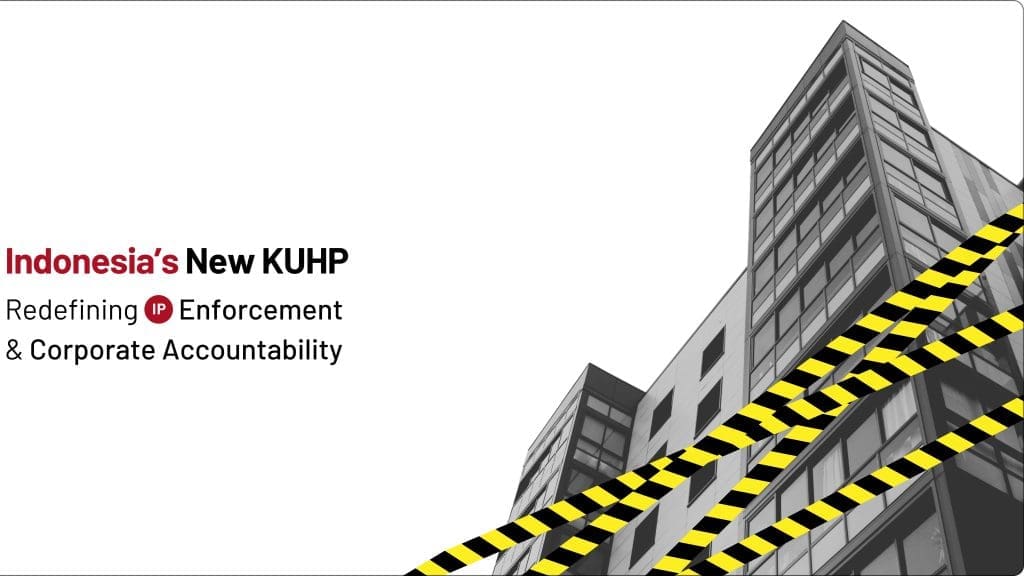Indonesia’s new KUHP is Set to Redefine IP Enforcement
Indonesia’s new Kitab Undang-Undang Hukum Pidana (KUHP) or Criminal Code, set to take effect in 2026, will introduce a transformative framework for law enforcement – including intellectual property (IP) protection. Below, we explore the implications of the new KUHP on IP enforcement, and how we can help businesses address the upcoming changes.
From Colonial to Restorative
Indonesia’s KUHP replaces colonial-era criminal laws with a more modern, restorative justice framework. The potential changes being discussed are not just symbolic, they introduce procedural, corrective, and rehabilitative principles that affect how criminal cases, including IP infringements, are handled. While the KUHP does not contain standalone IP provisions, it harmonizes with sectoral laws such as the Copyright, Trademark, and Patent Laws, creating a more coherent enforcement environment.
In practice, the new KUHP serves as the unified framework for criminal sanctions, while sectoral IP statutes remain essential for defining infringement elements. Penalties will now be determined under the KUHP, ensuring consistency across cases. This structure is expected to provide greater clarity and strengthen the enforcement of IP rights.
Key Issues and Implications
• Ultimum Remedium Principle
The KUHP reinforces the idea that criminal sanctions should be a last resort. For IP cases, this means alternatives such as warnings, mediation, and civil litigation are encouraged. Note that criminal complaints, as preliminary steps toward effective raid actions, may still be pursued early.
• Accountability
The KUHP allows for the prosecution of corporations, broadening the scope of liability in IP infringement cases. Legal entities and even informal groups can be held accountable.
• Standardized Sanctions
The KUHP introduces proportional fines and alternative sanctions, addressing inconsistencies across sectoral laws. For example, penalties of trading counterfeit pharmaceuticals differ between Trademark and Health Laws – KUHP aims to address these gaps.
What This Means for Businesses
The new KUHP introduces both challenges and opportunities for businesses operating in Indonesia, especially those reliant on intellectual property assets.
1. Heightened Corporate Liability
Under the revised KUHP, corporations are now explicitly recognized as subjects of criminal offenses. This means businesses can be held criminally liable for IP violations committed by employees, subsidiaries, or even third-party contractors.
Depending on the situation, prosecution and penalties may apply to the corporation or extend to its management, including controlling parties and beneficial owners. When management acts solely on behalf of the corporation, liability rests with the corporate entity. However, if actions are taken for personal gain, both the corporation and its management may be held liable.
Companies must ensure robust internal compliance mechanisms to avoid exposure to criminal prosecution.
2. Brand Protection and Enforcement Strategy
Trademark misuse – such as unauthorized branding or packaging – will be subject to criminal penalties of up to four years in prison or fines up to IDR 500 million. While enforcement still requires a formal complaint from the IP owner, the new KUHP confirms the legal basis for action against counterfeiters and brand infringers.
3. Sector-Specific Vulnerabilities
Industries such as pharmaceuticals, fashion, and consumer electronics – where IP infringement is prevalent – must be especially vigilant. The KUHP’s provisions could be leveraged to pursue criminal action in cases where civil remedies are insufficient or ineffective.
Contact us to discuss this in further detail or subscribe to our newsletter for more IP updates.
- Contact SKC Law team now
- Submit a custom inquiry via our Contact Page
- Follow us on LinkedIn





